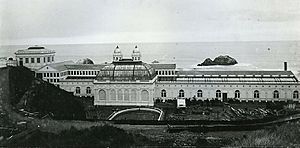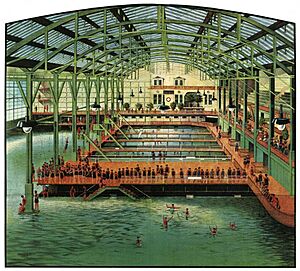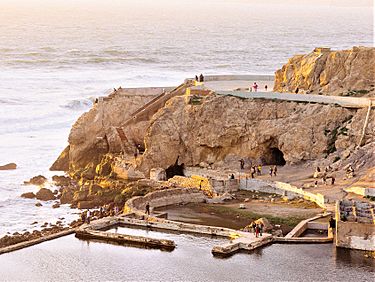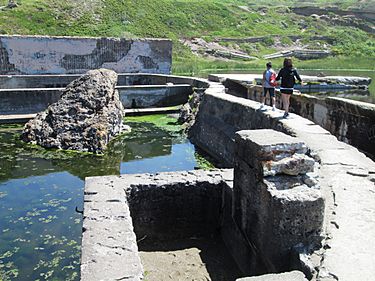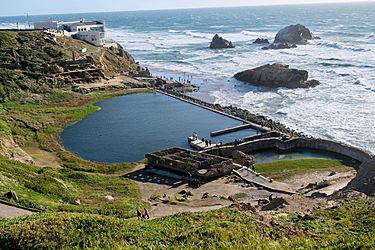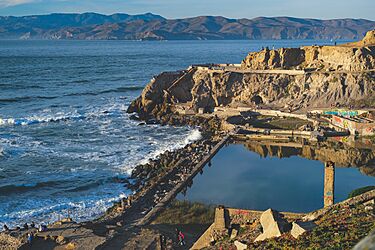Sutro Baths facts for kids
The Sutro Baths was a huge, amazing swimming pool complex in San Francisco, California. It was built way back in 1894 by a rich businessman named Adolph Sutro. Imagine a giant building with many pools right by the ocean! The baths were located near Lands End, close to Ocean Beach and the famous Cliff House. Sadly, the building burned down in 1966. Today, you can still visit the concrete ruins, which are now part of the Golden Gate National Recreation Area.
Contents
A Look Back at Sutro Baths
The Sutro Baths first opened to the public on March 14, 1896. It was known as the world's largest indoor swimming pool area! Adolph Sutro, who built the baths, was a very successful businessman. He even served as the mayor of San Francisco from 1895 to 1897.
The baths were built right below the Cliff House, which Adolph Sutro also owned. Both places are now part of the Golden Gate National Recreation Area. This area is looked after by the U.S. National Park Service.
Challenges and Changes
Running such a huge place was very expensive. The Sutro Baths faced many money problems over the years. Because of this, part of the baths was later changed into an ice skating rink. A wall separated the rink from the swimming pools. This lasted until 1964, when the property was sold. New owners planned to build tall apartment buildings there.
Fighting for Fairness
In 1897, the Sutro Baths became part of an important fight for equal rights. A man named John Harris was not allowed into the baths because of his race. He decided to sue Adolph Sutro. John Harris won his case! This was a big victory against treating people differently in public places. It helped show that everyone should have fair access to public spaces.
The Fire of 1966
In June 1966, a fire destroyed the building. At the time, the baths were already being taken apart. Investigators later found that the fire was started on purpose. After the fire, the people who bought the land left San Francisco. Today, only the concrete walls, old stairs, and tunnels remain.
What Was Inside Sutro Baths?
The Sutro Baths was an amazing place with lots of cool features. A report from 1912 tells us about the materials used. It had a huge amount of glass, iron, wood, and concrete.
How the Pools Were Filled
The baths used ocean water! When the tide was high, water would flow right into the pools from the nearby ocean. This helped refresh the two million gallons of water in about an hour. When the tide was low, a powerful pump could fill the pools. It could move 6,000 gallons of water every minute! This meant all the water could be recycled in about five hours.
Fun Facilities
The Sutro Baths had many things to do:
- Six saltwater pools and one freshwater pool. The pools were very long and wide, holding over 1.8 million gallons of water!
- Seven slides, 30 swinging rings, and a springboard for diving.
- A museum with a large collection of stuffed animals, old items, and artwork.
- A big amphitheater with 2,700 seats for shows.
- 517 private dressing rooms for visitors.
- An ice skating rink, added later on.
Getting There
Two different train lines used to take people to the baths. One line, the Ferries and Cliff House Railroad, ran along the cliffs. The other, the Sutro Railroad, used electric trolleys. It connected the baths to Golden Gate Park and downtown San Francisco.
Ruins gallery
-
Ruins looking South with Cliff House in distance, Seal Rocks to right, 2018
See also
- 49-Mile Scenic Drive
- Lurline Baths
- Natatorium
 | Dorothy Vaughan |
 | Charles Henry Turner |
 | Hildrus Poindexter |
 | Henry Cecil McBay |


